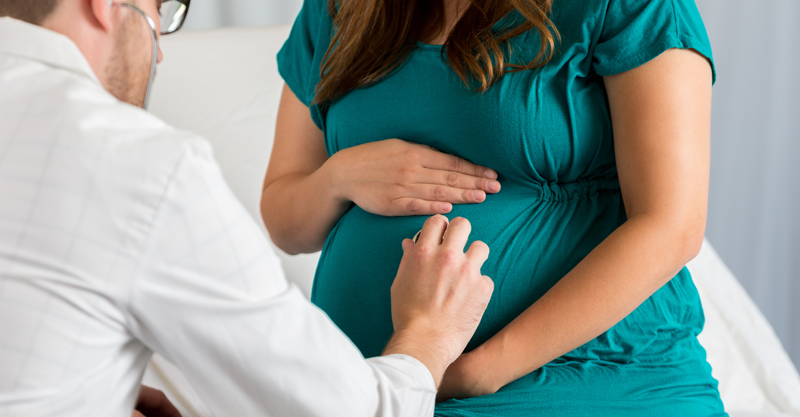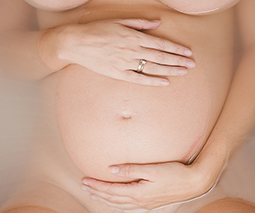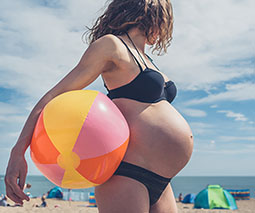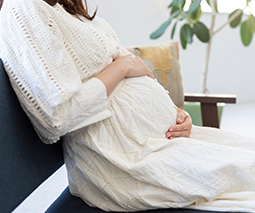10 most common questions (and answers!) from pregnant women at the doctor

Pregnant mums, have you ever gone to the obstetrician full of questions, but forgotten to ask something crucial while you’re there? Appointments can be up to a month apart and it’s frustrating to have to wait another month just because you forgot what you were going to say! Babyology chatted with Sydney-based obstetrician and gynaecologist Rob Buist to get the lowdown on the things expecting mums sometimes forget.
1. What is the first piece of advice you give any expectant mum?
First I congratulate the woman, take her medical history and check on the baby with an ultrasound scan. We then discuss food safety and checking for chromosomal abnormalities. It is really important that pregnant women avoid foods that may contain listeria and toxoplasmosis. We also discuss testing for chromosomal problems like Down Syndrome. Most women these days do this with a blood test at around 10 weeks gestation. This test is called the Non Invasive Prenatal Test but is also known as the Harmony test.
2. What do you think expectant mums overlook in terms of their health and baby’s?
In this day and age most women are extremely well informed about pregnancy and birth so they rarely overlook anything. Having said that, we know that your mental health can deteriorate during your pregnancy as well as after the birth and I believe many women (and their partners) don’t pay enough attention to this issue. If you are feeling unusually sad, tearful and are having difficulty sleeping it may not just be “hormones”. Please talk to your caregiver.
3. What are your tips to help mums stay healthy during pregnancy?
A healthy balanced diet that is low in carbohydrates and fat is really important. Similarly, regular – at least 30 minutes four times a week – moderate aerobic exercise helps pregnant women stay healthy. On the other hand, getting some rest – particularly in the third trimester – is vital. This may be as simple as putting your feet up and having a cup of tea or a cold drink after a day at work (hopefully your partner can unload the appliances and start cooking dinner). “Nana naps” at the weekends are perfectly sensible.
4. What is a common concern your patients come to you with during pregnancy and what advice do you give?
I’m most commonly asked about normal weight gain in pregnancy. To answer this I need to explain that we use something called the Body Mass Index or BMI in order to measure how obese – or otherwise – you are. Having a normal BMI (that is, being neither too thin nor overweight) around the time you conceive is by far the most important weight-related issue in pregnancy – so the best time to think about your weight is before you conceive. Women with an increased BMI are at risk of a number of complications of pregnancy including Caesarean birth and gestational diabetes, which may in turn have implications for the baby. Women with a normal BMI at the beginning of pregnancy should expect to gain somewhere between 10 and 16kg in their entire pregnancy. Women with an increased BMI should try to gain as little as 5kg.
5. Why is staying hydrated so important during pregnancy?
Pregnant women require more water because their extracellular fluid space (including blood plasma) increases and the developing pregnancy requires fluid (the majority of which is amniotic fluid). In addition, pregnant women lose more water than non-pregnant women. Blood volume, the work of the heart and blood flow through the kidneys all increase during pregnancy (the latter being the reason why pregnant women are always peeing!). In addition to losing water through urine, we lose water through sweating, blood flow to the skin and from our lungs. These so called insensible fluid losses also increase during pregnancy. The combination of the increased fluid demands and losses associated with pregnancy mean that women need to drink more fluid when they are pregnant. Australasian authorities recommend pregnant women drink 2.3 litres of fluid per day. Of course this figure should increase if you are vomiting, exercising or are in labour.
6. What are your tips for staying hydrated during pregnancy?
Your body has an extremely effective mechanism that assists you to hydrate appropriately. It is called thirst! This mechanism even adjusts for the fluid changes that occur in your body when you are pregnant. So it’s simple – drink if you are thirsty and if you are not thirsty you probably don’t need to hydrate. Your urine colour is another very simple indicator of your fluid status. If your urine is dark you need to hydrate; if it is pale you don’t. It is really important that you avoid drinks that contain too much sugar (sports drinks, soft drinks and fruit juices) or sodium (oral rehydration solutions and sports drinks) as well as those with too much caffeine (energy drinks). Obviously water is the perfect hydration product but many women find water hard to drink. If this is the case then I recommend a low sugar product like aquamamma®, which I developed specifically for pregnant and breastfeeding women.
7. How important is exercise for pregnant women?
It is important to be active – whenever possible – throughout your pregnancy. Exercise helps reduce some common symptoms of pregnancy (backache, constipation, bloating and swelling) as well as increasing your energy, improving your mood and improving your posture. Exercise may help prevent Gestational diabetes and it may improve your ability to cope with labour. Aim for at least 30 minutes of moderate exercise per day at least four days per week. The term “moderate” obviously varies for different women but the best guide is that your heart rate should rise and you should start sweating but still be able to talk normally whilst exercising. Make sure you warm up and stretch prior to exercising and cool down afterwards. You must stop exercising if you become breathless or fatigued.
Many women struggle to exercise during the first trimester when they feel sick, short of breath and exhausted. It is important to be patient during this time – do what you can but don’t worry if you can’t exercise so much – you will be able to get back into exercise in the second trimester.
In pregnancy your body produces increasing amounts of two hormones – progesterone and relaxin – that soften your ligaments. This process allows the joints of the pelvis (which is five bones, not one) to separate in order to allow as much room as possible for the baby to pass through it during labour. The problem is that this process can cause quite a lot of discomfort. Improving your core strength by doing Pilates and/or yoga may help to reduce the pain associated with separation of your pelvic bones. Relaxin and progesterone also soften your connective tissue, including that of your pelvic floor. This effect – along with the increasing weight of your baby (or babies!) – can place your pelvic floor muscles under strain. This is why I recommend you undertake pelvic floor exercises even prior to birth. A pelvic floor education session with a good women’s health physiotherapist is a really good idea during your pregnancy. Obviously continuing your pelvic floor exercises after the birth is really important and may reduce your risk of prolapse and bladder problems after childbirth.
8. What advice do you have for expectant mums as they start to consider their birth plan?
The most critical aspect of developing a birth plan is to remember it is just that – a plan, and not a strict set of rules that you and your caregivers must abide by. Labour and birth – while usually straightforward – can become very complex and/or difficult, often within a short space of time. When formulating your birth plan you need to acknowledge that situations can change and it is important that you can adapt if circumstances require it. Please remember the goal of the process is the safe arrival of a healthy baby (or babies) to a healthy, happy mother.
9. When is it ok to give into food cravings during pregnancy?
Within the realms of food safety and common sense it is always ok to give in to your food cravings! You’ve had to give up alcohol and lots of caffeine so succumbing to the odd chocolate craving is perfectly reasonable. Even though we tell you to avoid too many carbs sometimes that’s the only thing you can stomach in the first trimester – so go for it.
10. What other tips do you have for expectant mums?
Don’t be too hard on yourself. Many of us are hard-working, self-driven people who always feel in control of our destinies. Pregnancy, birth and parenting are not like that (for mere mortals, at least). It’s normal to feel exhausted and unable to exercise in the first trimester. It’s normal to feel exhausted, hot and swollen in the third trimester. Births may not always go entirely according to plan and if they don’t, it’s not your fault. Learning to breastfeed is never easy. There is no such thing as a perfect parent. So give yourself a break. That basketful of unfolded laundry in the middle of your living room can wait (if you know what I mean).
(This is a sponsored post for aquamamma®)
You can buy aquamamma directly from the aquamamma® website and in leading pharmacies.
®AQUAMAMMA is a registered trade mark.









